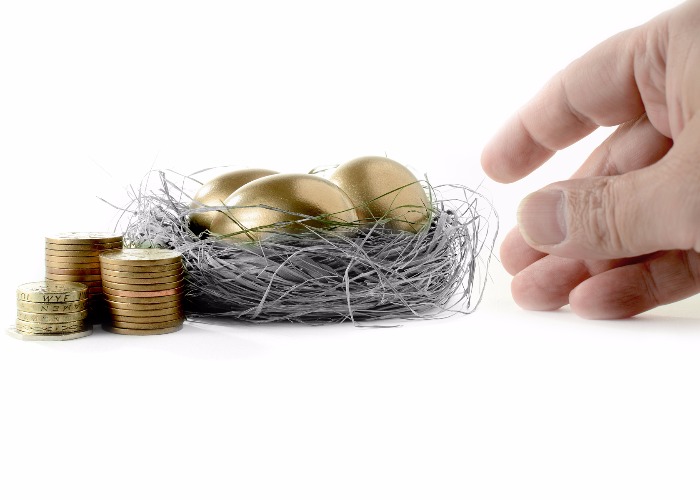Defined benefit pension transfer values at 'record high' - should you cash in?

Defined benefit pensions transfer values have soared over the last 12 months. But is it a good idea to swap a guaranteed income for a lump sum?
The transfer values for defined benefit (DB) pension schemes have soared to ‘record levels’ over the last year, according to insurer Royal London.
Six million workers in the UK have a DB pension, which pays a guaranteed income for life based on their final salary or average career earnings, and most have the right to swap their entitlement for cash.
With new pension freedoms introduced last year and transfer values at record highs there’s never been a more tempting time to do it.
Some are reportedly being offered swaps which are worth 10s of thousands of pounds more than a year ago.
Right now it’s not uncommon for someone with a guaranteed pension income worth £20,000 to be offered 30 times that amount – equivalent to £600,000 in cash.
However, Royal London's in-depth report highlights that, while there are benefits to selling a DB pension, there are also good reasons to keep hold of it.
Plan for your future: visit the loveMONEY investment centre today
The benefits of cashing in
Selling a defined benefit pension gives you more flexibility about when and how to use your pension cash.
Some defined benefit schemes have a set pension age for example. But if you were to transfer into cash and put the money into a defined contribution scheme you can benefit from new freedoms that allow you to access the cash from the age of 55.
Royal London says there’s also the potential of extra tax-free cash. The way that tax-free cash is worked out within some defined benefit schemes can be ungenerous, so transferring out can make a larger tax-free sum available.
Plus, releasing the money means it’s easier to pass on your pension when you die. Under new rules cash balances left in transferred funds can be passed on in full to heirs.
Cashing in also benefits those that know their life expectancy is going to be short.
Lastly if you have worries about the sponsoring employer it might be a good idea to jump ship.
With a defined benefit scheme if your employer goes out of business, like BHS did earlier this year, you could end up in the Pension Protection Fund which can pay a reduced level of benefits.
Read more in: Pension Protection Fund: what it is and how much compensation you get.
Why cashing in could be a bad move
Royal London is warning that keeping hold of a defined benefit pension makes sense for many people and so cashing in could be a bad move.
That’s mainly because of the certainty they offer. Defined benefit pensions are paid out for as long as you live, whereas there’s always the risk that transferred cash will run out.
Defined Benefit pensions also have in-built inflation protection, which means the value of your income will keep pace with increases in the cost of living.
If you do cash in your pension you will lose this protection and will be in charge of guarding against the eroding impact of inflation.
Over a retirement that could last 20 or 30 years, the value of having an income protected against rising prices could be very valuable indeed.
Defined benefit pensions are also a source of risk-free income.
That’s because the amount of money you get from a defined benefit pension scheme is not hooked to the ups and downs of the stock market.
The scheme still has to pay your promised pension and the employer takes on the investment risk. Transferring out and investing the money yourself means you take on the risk yourself.
Plan for your future: visit the loveMONEY investment centre today
Should you cash in?
When you sell a defined benefit pension the decision is irreversible and you have to sell the whole lot, so you should carefully consider the implications before deciding to do so.
The Financial Conduct Authority (FCA) recommends that you should start from the assumption that it is not in the best interest to exchange a DB pension for cash.
However, you should weigh up whether the move would benefit your situation.
For those who want to maximise tax-free cash, do not expect to live long or are thinking about inheritance planning and/or are worried about the employer running the scheme it could be a good decision.
On the other hand, those that are after certainty, value inflation protection and don’t want to take on any investment risk could benefit from staying put.
If you are unsure what the best path to take is, it may be worth talking to a financial advisor.
For those with a DB pension pot with a transfer value of £30,000 or more this is a legal requirement.
Steve Webb, director of policy at Royal London said: “Regulations quite properly stress the many advantages of a final salary pension, and for many people leaving their pension rights untouched is the right thing to do.
"But for some, the option of transferring out some or all of their pension into cash is worth seriously considering.
“It is vital both that workers are aware of the value of the pension rights they have and also that they can get impartial and expert advice on whether a transfer might be right for them.
"We urgently need the rules and regulations in this area to be updated to the potential benefit of millions of workers.”
Interested in a SIPP or a stocks & shares ISA? Visit the loveMONEY investment centre today
Live a richer life
How to boost your income in retirement
State Pension: 6 mistakes that impact how much you get paid
Comments
Be the first to comment
Do you want to comment on this article? You need to be signed in for this feature